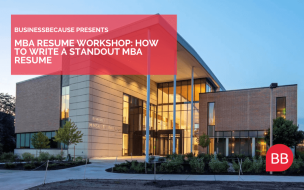So, how can you ensure you remain valuable and competitive in the ever-changing world of business?
One way to secure your future is by studying for an MBA. Advanced education offers more than theoretical knowledge—business school can help you build a strategic network and gain experiential learning opportunities. These are all things that may help you create an impact in the business world.
Michigan State University's (MSU) Broad College of Business's MBA exemplifies this transformative journey, equipping students with the skills and connections necessary to thrive in diverse industries.
BusinessBecause spoke with Jacob Winston-Galant, senior associate director at MSU Broad’s Russell Palmer Career Management Center, to learn about the return on investment (ROI) students see and how business school elevates careers.
You’ll establish skills with a diverse industry reach
One of the hallmarks of an MBA program's success is its ability to cultivate leaders across industries.
Michigan State University Broad College of Business boasts a diverse alumni network spanning industries such as finance, technology, healthcare, manufacturing, and consulting.
“In our graduating Class of 2024, we have seen folks successfully attain a variety of different job functions at a diverse set of industries across a wide array of geographies,” Jacob explains.
Among some of the top companies that hire MSU Broad MBA students for full-time jobs include PepsiCo, Amazon, Intel, EY, Procter & Gamble, Microsoft, AT&T, Accenture, Target, GEP, and Regeneron Pharmaceuticals.
This breadth of representation underscores the adaptability and applicability of the skills students gain in the MBA program.
Graduates emerge with an understanding of industry-specific challenges and opportunities, which enables them to elevate their position in whatever career they are in.
“The Palmer Center will coach each individual student and help enable tools and practice skill sets at whichever juncture of their job and internship search they’re at,” Jacob says.
MSU also places a strong emphasis on teaching skills and techniques that will allow students to switch career paths—a common catalyst for choosing to study for an MBA.
“The key to navigating and enabling these changes successfully is by coaching students to be able to clearly communicate how the unique skills that they gained in their pre-MBA professional careers are directly applicable to the job shift that they are aiming to facilitate,” Jacob adds.
You gain real world business knowledge during experiential learning opportunities
Beyond traditional classroom instruction, experiential learning is an integral component of the MBA curriculum.
The Broad College of Business embraces a holistic approach, offering experiential learning opportunities that range from consulting projects with local businesses to global immersion experiences to internships during the summer between their two years.
“We facilitate a networking and career fair preparation seminar in September to ensure that students who attend those conferences do so in a way that confidently markets their skills and overall bolsters their job candidacies,” Jacob explains.
Michigan State's MBA 843 career management course integrates career management into the curriculum, covering topics from career assessments to interview preparation. Through consulting projects and global immersion experiences, students apply theoretical knowledge in real-world settings, honing their problem-solving skills.
Such immersive experiences enrich the academic journey and imbue students with practical skills and confidence that they can bring to their careers.
Internships are also an essential part of experiential learning during an MBA and MSU makes connecting students with the right company a priority.
“We want to help students as much as possible to find an MBA internship that matches their professional interests.
“The coaches meet individually with students because no two backgrounds nor anticipated career pathways are the same; we want to provide a customized approach and get to know each student before they even begin the MBA program,” Jacob explains.
You’ll gain robust networking skills that will elevate your career
Networking remains a cornerstone of career advancement, and business schools recognize its significance.
At Michigan State, there are ample networking opportunities, both within the campus community and through extensive alumni engagement initiatives.
“Being a Michigan State alum and Broad College alum are incredibly meaningful designations in the marketplace, graduates form part of an expansive alumni base with a presence in most of the major companies and organizations across the globe,” Jacob says.
In the MBA curriculum, students develop networking skills through workshops and mock events, leveraging the expansive alumni network to bolster their professional connections.
“In the career management course, MBA 843, we help enable students with network skills: instilling confidence and know-how for conversations with alumni and other business professionals, culminating in a mock networking mixer that mirrors the experiences that they’ll encounter for the rest of their careers.”
Events, workshops, and seminars facilitate meaningful connections with industry leaders, fostering mentorship opportunities, and opening doors to career prospects.
Overall, the MBA ROI extends far beyond gaining knowledge. It encompasses a transformative journey that includes industry immersion, networking prowess, and experiential learning.
By nurturing talent across diverse industries, fostering meaningful connections, and embracing experiential learning, business schools pave the way for future leaders to make an impact in the global marketplace.









